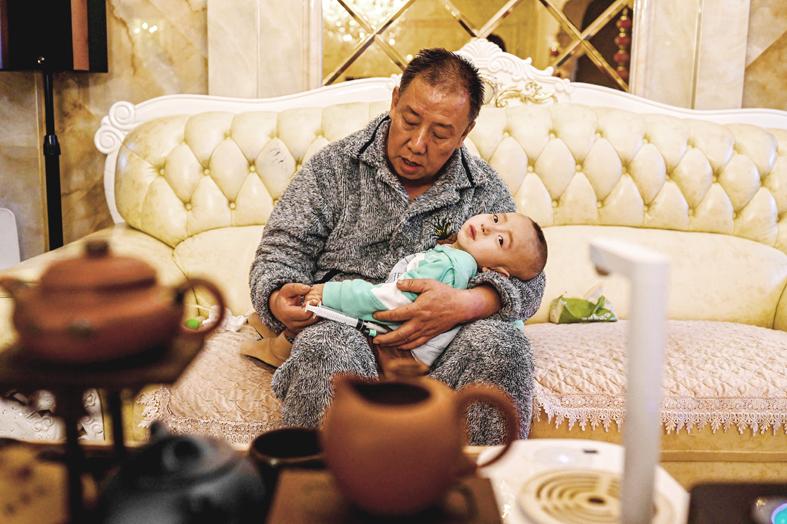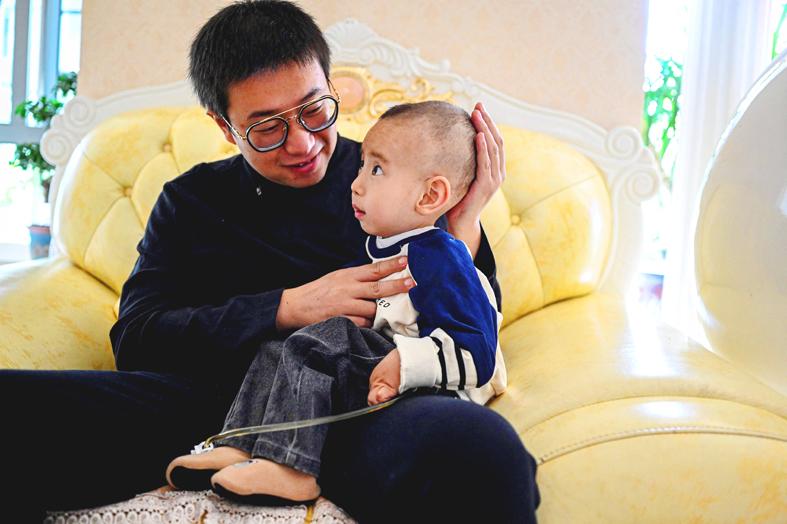Two-year-old Xu Haoyang (徐灝洋) has likely just months to live — but the only medicine that can help his rare genetic condition is not found anywhere in China and closed borders due to the COVID-19 pandemic mean that he cannot travel for treatment.
Instead, his desperate father, Xu Wei (徐偉), has created a home laboratory to create a remedy for the boy himself.
“I didn’t really have time to think about whether to do it or not. It had to be done,” the 30-year-old said from his DIY lab in an apartment building in southwestern Kunming.

Photo: AFP
Haoyang has Menkes syndrome, a genetic disorder that affects how copper — which is crucial for brain and nervous system development — is processed in the body. Those with the syndrome rarely survive beyond the age of three.
However, Xu, who has only a high-school education and ran a small online business before his son became ill, is determined to give him a fighting chance.
“Even though he cannot move or speak, he has a soul and feels emotions,” he said, holding Haoyang in his lap to give him a drink of honey mixed with water.

Photo: AFP
After being told the disease was incurable and the only medication that could help ease symptoms was not available in China, he began researching and teaching himself pharmaceuticals.
Most online documents on Menkes syndrome are in English, but Xu used translation software to understand them, before setting up a home lab in his father’s gym.
On discovering that copper histadine could help, he set up the equipment to create it himself, mixing copper chloride dihydrate with histidine, sodium hydroxide and water.
Now, Xu gives Haoyang a daily dose of homemade medicine, which gives the child some of the copper his body is missing.
The amateur chemist said that a few of the blood tests returned to normal two weeks after beginning the treatment.
The toddler cannot talk, but he gives a smile of recognition when his father runs a gentle hand over his head. His wife, who did not want to give her name, cares for their five-year-old daughter in another part of the city.
Menkes syndrome is more prevalent in boys than girls, and it is estimated that one in 100,000 babies are born with the disease worldwide, organization Rare Diseases said.
There is little information or data available, but Xu said that pharmaceutical companies have shown little interest, as the treatment “does not have commercial value and its user group is small.”
Under normal circumstances, he would have traveled abroad to bring back treatments for Haoyang from specialist centers overseas, but China has largely closed its borders since the start of the COVID-19 pandemic.
Xu felt that he had no choice but to make the medicines himself.
“At first, I thought it was a joke,” Haoyang’s grandfather, Xu Jianhong, said. “[I thought] it was an impossible mission for him.”
However, six weeks after throwing himself into the project, Xu produced his first vial of copper histidine.
To test it, he first experimented with rabbits and then injected the treatment into his own body.
“The rabbits were fine and I was fine, so I tried it on my son,” he said.
Reassured, he then started gradually increasing the dosage — but the medicine is not a cure.
Annick Toutain, rare disease specialist at Tours University Hospital in France, said that the copper treatment “is only efficient against certain genetic anomalies and if it is administered very early on, in the first three weeks of life.”
After that, the treatment would alleviate symptoms, “without leading to recovery,” she said.
Xu has accepted that it can “only slow down the disease.”
His work has led to interest from biotech firm VectorBuilder, which is launching gene therapy research with Xu into Menkes syndrome.
VectorBuilder chief scientist Bruce Lahn described it as “a rare disease among rare diseases,” and said that they were inspired after learning about Xu’s family.
Clinical trials and tests on animals could happen in the next few months.
Xu has even been contacted by other parents whose children have been diagnosed with Menkes, asking him to make treatment for their relatives too — something he has refused.
“I can only be responsible for my child,” he said, while health authorities have said that they would not intervene as long as he only makes the treatment for home use.
Huang Yu (黃昱) of Peking University’s Medical Genetics Department said that as a doctor, he is “ashamed” to hear of Xu’s case.
Huang said he hopes that “as a developing country, we can improve our medical system to better help such families.”
With a full-time role as an amateur chemist, Xu has little income and relies mainly on his parents.
Friends tried to talk him out of his medical efforts, but the young father is planning to study molecular biology at university and do everything he can to protect his son.
“I don’t want him to wait desperately for death. Even if we fail, I want my son to have hope,” he said.

POLITICAL PRISONERS VS DEPORTEES: Venezuela’s prosecutor’s office slammed the call by El Salvador’s leader, accusing him of crimes against humanity Salvadoran President Nayib Bukele on Sunday proposed carrying out a prisoner swap with Venezuela, suggesting he would exchange Venezuelan deportees from the US his government has kept imprisoned for what he called “political prisoners” in Venezuela. In a post on X, directed at Venezuelan President Nicolas Maduro, Bukele listed off a number of family members of high-level opposition figures in Venezuela, journalists and activists detained during the South American government’s electoral crackdown last year. “The only reason they are imprisoned is for having opposed you and your electoral fraud,” he wrote to Maduro. “However, I want to propose a humanitarian agreement that

ECONOMIC WORRIES: The ruling PAP faces voters amid concerns that the city-state faces the possibility of a recession and job losses amid Washington’s tariffs Singapore yesterday finalized contestants for its general election on Saturday next week, with the ruling People’s Action Party (PAP) fielding 32 new candidates in the biggest refresh of the party that has ruled the city-state since independence in 1965. The move follows a pledge by Singaporean Prime Minister Lawrence Wong (黃循財), who took office last year and assumed the PAP leadership, to “bring in new blood, new ideas and new energy” to steer the country of 6 million people. His latest shake-up beats that of predecessors Lee Hsien Loong (李顯龍) and Goh Chok Tong (吳作棟), who replaced 24 and 11 politicians respectively

Young women standing idly around a park in Tokyo’s west suggest that a giant statue of Godzilla is not the only attraction for a record number of foreign tourists. Their faces lit by the cold glow of their phones, the women lining Okubo Park are evidence that sex tourism has developed as a dark flipside to the bustling Kabukicho nightlife district. Increasing numbers of foreign men are flocking to the area after seeing videos on social media. One of the women said that the area near Kabukicho, where Godzilla rumbles and belches smoke atop a cinema, has become a “real

‘WATER WARFARE’: A Pakistani official called India’s suspension of a 65-year-old treaty on the sharing of waters from the Indus River ‘a cowardly, illegal move’ Pakistan yesterday canceled visas for Indian nationals, closed its airspace for all Indian-owned or operated airlines, and suspended all trade with India, including to and from any third country. The retaliatory measures follow India’s decision to suspend visas for Pakistani nationals in the aftermath of a deadly attack by shooters in Kashmir that killed 26 people, mostly tourists. The rare attack on civilians shocked and outraged India and prompted calls for action against their country’s archenemy, Pakistan. New Delhi did not publicly produce evidence connecting the attack to its neighbor, but said it had “cross-border” links to Pakistan. Pakistan denied any connection to